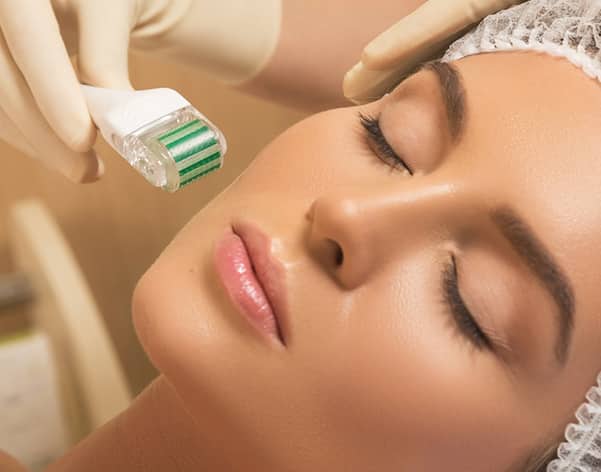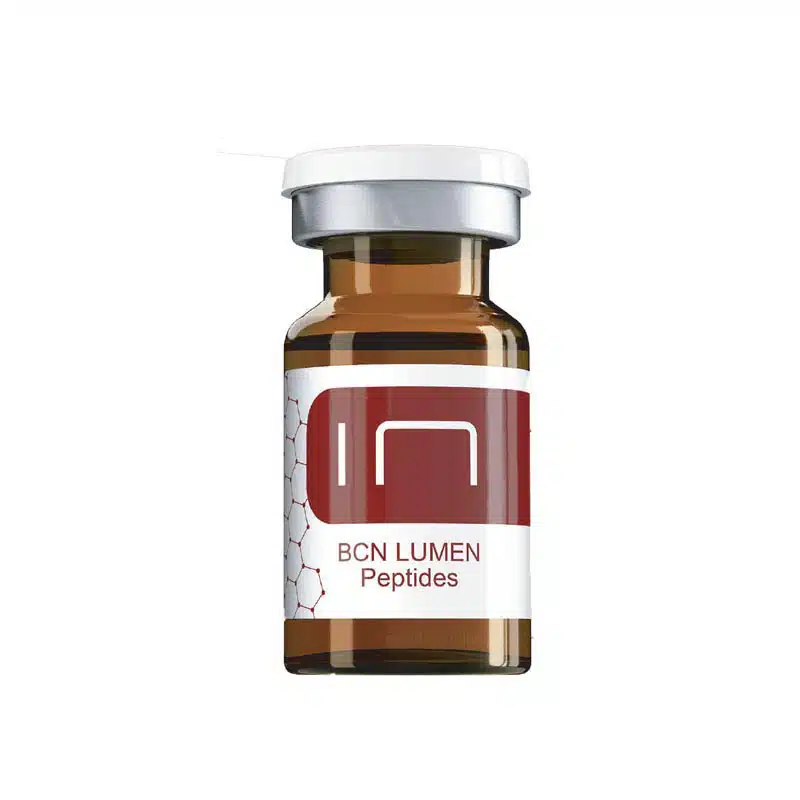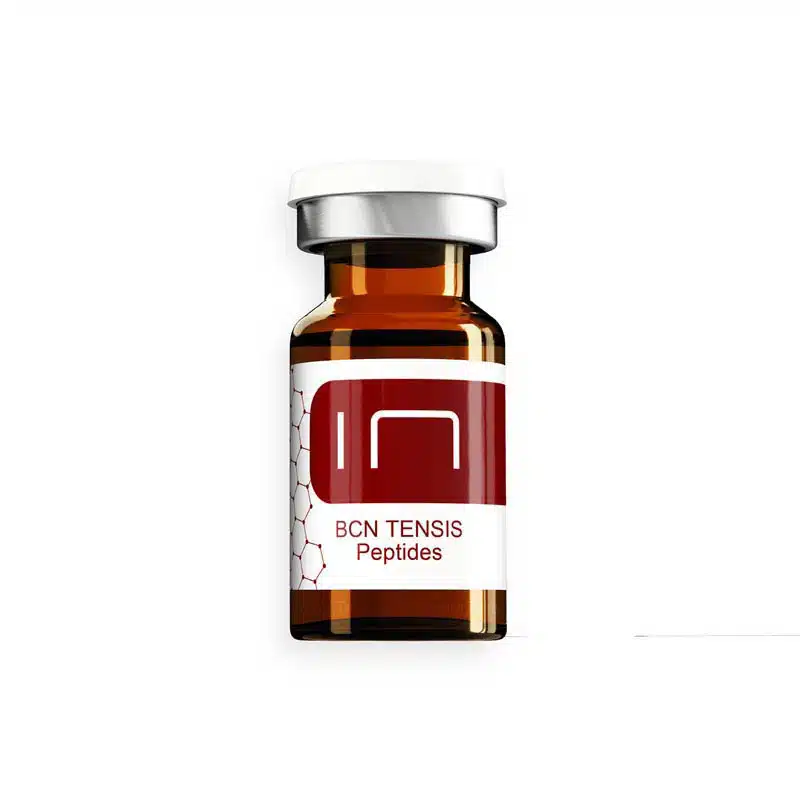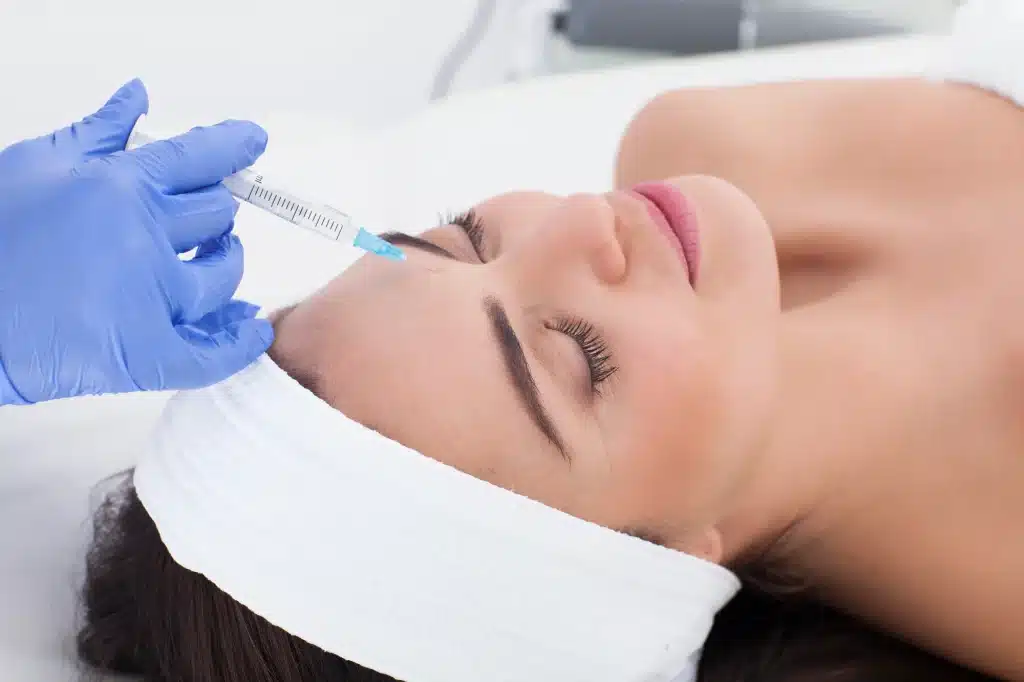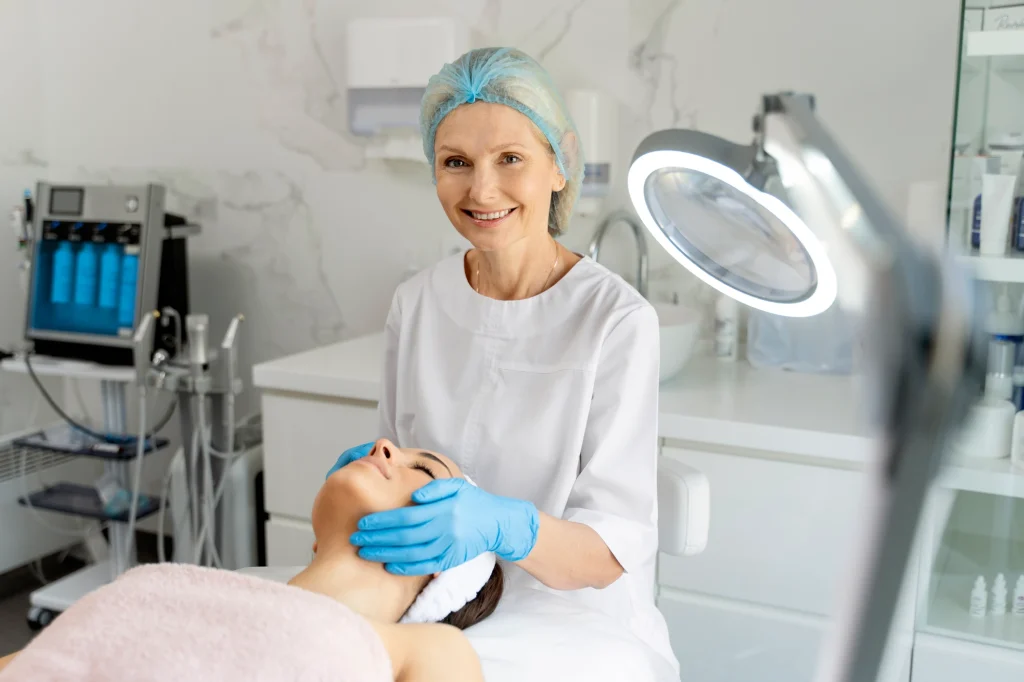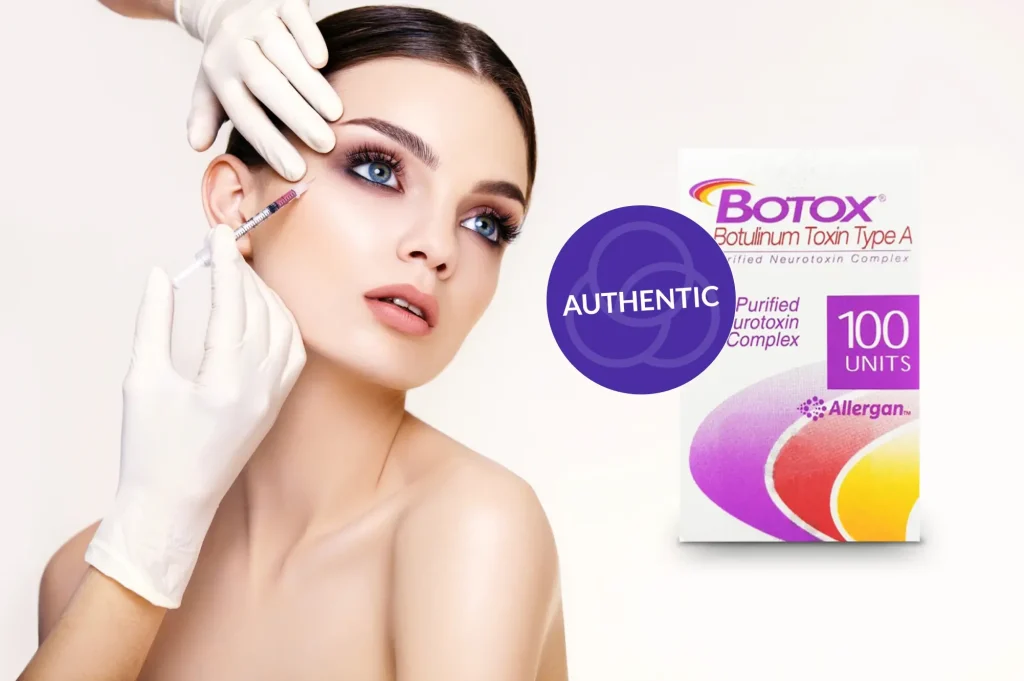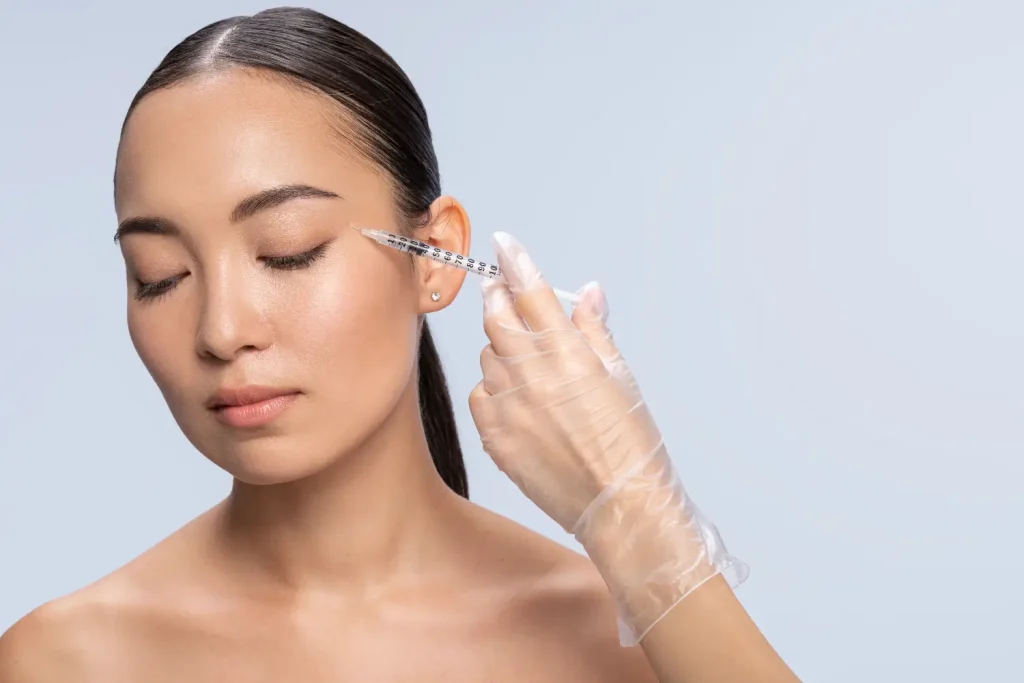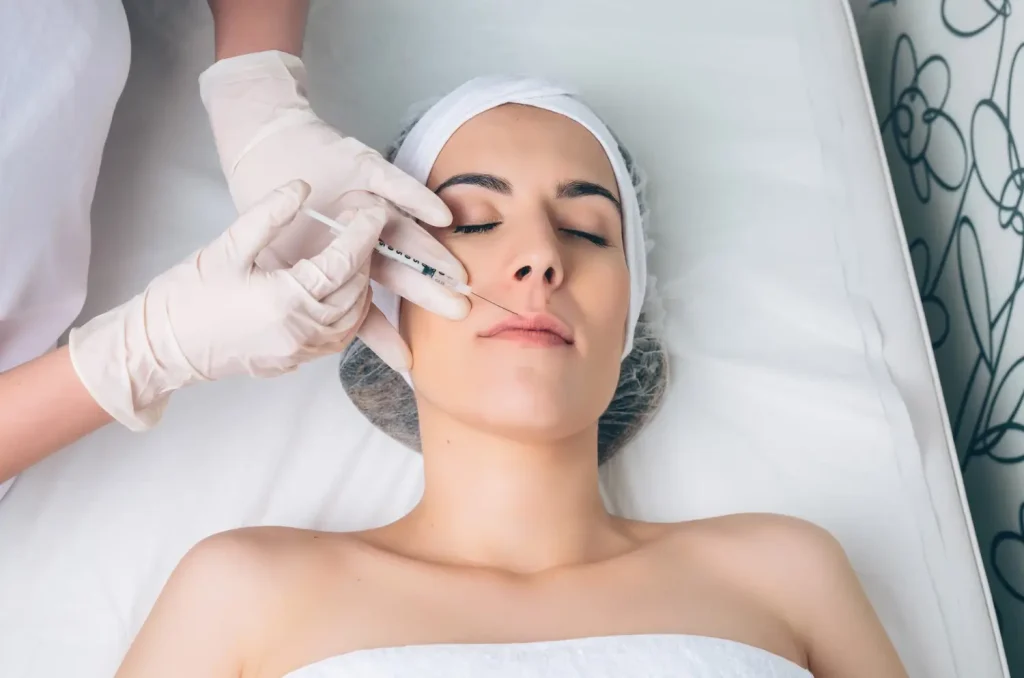Peptides are short chains of amino acids, the building blocks of proteins like collagen, elastin, and keratin. They act as messengers and signal the skin to increase collagen production, repair damage, and maintain hydration.
Unlike larger proteins, peptides are small enough to penetrate the skin’s surface. This makes them effective topical ingredients for anti-aging, barrier repair, and overall skin health, especially after the age of 25, when patients start losing 1% of collagen every year. 1
But does their effectiveness mean patients should make them a staple in their routines? Read on to learn the benefits of peptides for skin and why they might lead to better skincare outcomes.
Key Takeaways
- Clinical studies show that peptides increase collagen and elastin production, which reduces wrinkles and improves skin firmness.
- Unlike harsh actives, peptides improve the skin barrier and calm inflammation, which makes them suitable for all skin types.
- Peptides soften dynamic wrinkles by inhibiting muscle contractions and provide a non-invasive alternative to neurotoxins like Botox.
- Research shows that peptides target hyperpigmentation at the cellular level and block melanin production without the harsh side effects of ingredients like hydroquinone.
- Peptides allow med spa owners and dermatologists to treat sensitive skin types and post-procedure patients who may not tolerate conventional therapies.
6 Benefits of Peptides for Skin
Skincare trends come and go, but skin peptides don’t seem to be going anywhere. Here are six reasons why it’s a good idea to recommend peptides to your patients:
1. Peptides Stimulate Collagen Production to Reduce Wrinkles
Collagen makes up about 25-35% of the body’s protein content and maintains the structure of the skin. However, with aging, collagen synthesis declines and connective tissue begins to break down, which leads to wrinkles and laxity.
Peptides have the potential to reduce this aging effect and slow down the development of wrinkles. A 2024 in vitro study published in Frontiers in Medicine found that collagen peptides upregulated COL1A1 gene expression by over 40% in human dermal fibroblasts (p<0.005). 2 This led to an increased elastin (ELN) and versican (VCAN) production, which are both proteins that maintain extracellular matrix cohesion.
Peptides created these results because they increased synthesis and the inhibition of collagen-degrading MMPs, with confocal microscopy showing denser collagen fibril networks after peptide treatment (p<0.05).
2. Peptides Strengthen the Skin Barrier
The skin barrier relies on ceramides, cholesterol, and fatty acids to maintain its protective function. But aging and environmental stressors can cause patients to lose these lipids, which creates dryness, sensitivity, and inflammation.
Peptides like OS-01 have been shown to improve skin barrier integrity because they increase ceramide production and reduce cellular senescence.
In fact, a 2025 Journal of Cosmetic Dermatology trial showed a 31% transepidermal water loss (TEWL) reduction in older patients using OS-12 formulations over 12 weeks, with 70% reporting visibly improved skin texture and hydration. 3
The peptide formulation worked in two ways here. It upregulated ceramide synthesis through PPAR-γ activation and targeted senescent cells, which reduced proinflammatory secretions (SASP) that compromise skin function and barrier.
3. Peptides Inhibit Muscle Contractions to Soften Dynamic Lines
Repeated facial expressions cause underlying muscles to contract, creating temporary folds in the skin. As collagen and elastin degrade with age, these folds become etched into the skin as permanent dynamic wrinkles, like crow’s feet, forehead lines, and glabellar folds.
Unlike static wrinkles caused by volume loss, dynamic lines form specifically due to muscular activity, with neuromodulators like Botox as one option to slow their formation. However, peptides are also showing promise here.
A 2024 review found that peptides mimicked Botox’s mechanism by interrupting the signals that trigger muscle contractions. 4 Argireline, a synthetic peptide, reduced muscle activity by up to 30% and wrinkle depth within weeks.
Similarly, SYN-Ake, which is derived from viper venom, blocked acetylcholine receptors (nAChRs) and led to a 52% reduction in wrinkle severity after 28 days of use. Even plant-based options like Myoxinol (from okra) showed promise by modulating GABA receptors, which softened expression lines by 26% without injections.
4. Peptides Reduce Hyperpigmentation by Interfering With Melanogenesis
A 2024 study showed that the peptide Sfrp5pepD suppressed melanin synthesis by up to 60% by blocking the Wnt/β-catenin pathway, which regulates pigmentation. 5 This could help patients achieve an even skin tone without compromising safety or skin health.
Similarly, a 2020 study found that D-tyrosine-modified peptides inhibited tyrosinase activity by 40%, even after UV exposure, while maintaining their original anti-aging or anti-inflammatory functions. 6
Both of these peptides are promising for post-inflammatory hyperpigmentation (PIH) and melasma because they avoid the cytotoxicity of traditional agents like hydroquinone.
5. Peptides Provide Antioxidant Protection via Metal Ion Chelation
The skin faces constant assault from environmental oxidative stressors, especially UV radiation, which creates free radicals that degrade collagen, impair elasticity, and increase photoaging.
Peptides counteract this effect by chelating metal ions that catalyze oxidative damage while directly scavenging free radicals. According to a 2022 research article, collagen-derived peptides could scavenge up to 43% of DPPH radicals at low concentrations and protect human dermal fibroblasts from UVA-induced damage. 7
In addition, oral and topical collagen peptides increase SOD, CAT, and GSH-Px activity, which fight skin damage and reduce malondialdehyde (MDA), a marker of lipid peroxidation. 8
6. Peptides Increase Product Penetration Through Transdermal Signaling
The skin’s stratum corneum keeps out environmental threats, but it also makes it difficult for active ingredients to penetrate deep into the dermal layers. Conventional formulations often struggle to transport molecules larger than 500 Daltons across this tightly packed lipid-protein matrix.
Skin-penetrating peptides (SPPs) are bioengineered sequences that make this easier and help cosmeceutical and pharmaceutical ingredients go deeper into the skin without compromising its protective integrity. 9
A 2025 study showed that specialized SPPs like SPACE peptide and TD-1 increase skin permeation through protein-binding mechanisms without compromising the skin’s barrier function. 10 These peptides create transient pathways that enable efficient delivery of macromolecules up to 36 times more effectively than conventional methods.
Why Should You Include Peptides in Your Practice?
Skin peptide injections are great for your patients. But are they good for your practice? Yes, indeed. And here’s why:
1. Patients Are Asking for Peptides
Your clients are smarter than ever about skincare. They want products that actually work, and peptides do exactly what they’re looking for.
Studies show peptides increase collagen production by 28%, calm inflammation, and repair damaged skin barriers, all while being gentle enough for even the most sensitive skin types. This makes them suitable for a wide range of patients.
You could start by upselling peptide treatments in bundles (like microneedling and peptide masks) to your current client base to gauge their interest.
2. You Can Customize Them for Every Patient
Different types of peptides target different skin concerns, which means you can tailor treatments to each patient’s needs. For example, signal peptides stimulate collagen production and improve firmness, while anti-inflammatory peptides calm redness and support barrier repair.
You can create personalized treatment plans that address multiple issues at once, like aging, dryness, sensitivity, or acne. For instance, you could include peptides into post-procedure protocols (e.g., after laser resurfacing, chemical peels, or microneedling) to improve recovery and barrier restoration.
You could also pair peptides with advanced delivery systems, like liposomes or nanoparticles, to increase their penetration and efficacy.
3. You Can Stay Ahead of the Competition
The peptide therapeutics market is projected to grow at a compound annual growth rate (CAGR) of 9.5% from 2025 to 2035, reaching over US$123 billion by 2035. This shows a clear trend toward peptide-based treatments.
While other practices are still pushing traditional treatments, you can provide peptide therapies that create noticeable but safe results. Patients will appreciate that you’re bringing them the latest advancements in skincare science.
Final Words
As collagen production goes down with age, the skin starts to become loose and sag. While expensive treatments like facelifts and Botox provide quick fixes, they aren’t always accessible or suitable for all patients.
Peptides are a safe alternative that helps rebuild collagen, repair damage, and improve skin health naturally. But getting access to high-quality peptides can be difficult.
At Medical Spa Rx, we provide high-quality peptide formulations, like Peptide BCN, that deliver real results. Our products give med spas and dermatology practices the tools they need to offer effective, customizable treatments that meet the growing demand for clean, innovative skincare.
If you’re looking to purchase original and high-quality peptide formulations, get in touch with us today!
FAQs
Are Peptides Safe for All Skin Types?
Yes, peptides are generally gentle and well-tolerated. This makes them suitable for all skin types, including sensitive and acne-prone skin.
How Do Peptides Compare to Other Anti-aging Ingredients Like Retinoids?
Peptides stimulate collagen production without the irritation often associated with retinoids. They’re a gentler alternative or complementary ingredient in anti-aging skincare.
How Quickly Can Patients Expect to See Results From Peptide Treatments?
While individual results vary, many patients notice improvements in skin texture, firmness, and hydration within weeks of consistent peptide use.
Can Peptides Be Combined With Other Skincare Treatments?
Yes, peptides work well alongside ingredients like antioxidants, hyaluronic acid, and retinoids, as well as treatments such as microneedling or laser therapy.
What Types of Peptides Are Commonly Used in Skincare?
Common peptides include signal peptides (stimulate collagen), carrier peptides (provide trace elements like copper), and enzyme-inhibiting peptides (reduce wrinkles by relaxing muscles).
For instance, GHK-Cu (copper peptides), argireline, and palmitoyl pentapeptide-4 are some of the best peptides for skin tightening.
Can Peptides Replace Injectable Treatments Like Botox or Fillers?
No. While peptides are a non-invasive alternative that improves skin health and appearance, they do not provide the immediate muscle-relaxing or volumizing effects of injectables. However, they can complement those treatments.
References
- Reilly DM, Lozano J. Skin collagen through the lifestages: importance for skin health and beauty. Plastic and Aesthetic Research. 2021;8(2). doi:https://doi.org/10.20517/2347-9264.2020.153
- Dierckx S, Patrizi M, Merino M, González S, Mullor JL, Nergiz-Unal R. Collagen peptides affect collagen synthesis and the expression of collagen, elastin, and versican genes in cultured human dermal fibroblasts. Front Med (Lausanne). 2024;11:1397517. Published 2024 May 1. doi:10.3389/fmed.2024.1397517
- Zonari A, Brace LE, Buhrer LB, et al. OS-01 Peptide Topical Formulation Improves Skin Barrier Function and Reduces Systemic Inflammation Markers: A Pilot 12-Week Clinical Trial. J Cosmet Dermatol. 2025;24(4):e70169. doi:10.1111/jocd.70169
- Nguyen TTM, Yi EJ, Jin X, Zheng Q, Park SJ, Yi GS, Yang SJ, Yi TH. Sustainable dynamic wrinkle efficacy: Non-invasive peptides as the future of Botox alternatives. Cosmetics. 2024;11(4):118. doi:10.3390/cosmetics11040118
- Choi YS, Hong JG, Lim DY, et al. Small peptide derived from SFRP5 suppresses melanogenesis by inhibiting Wnt activity. Curr Issues Mol Biol. 2024;46(6):5420-5435. doi:10.3390/cimb46060324
- Park J, Jung H, Jang B, et al. D-tyrosine adds an anti-melanogenic effect to cosmetic peptides. Sci Rep. 2020;10:262. doi:10.1038/s41598-019-57159-3
- Li C, Fu Y, Dai H, et al. Recent progress in preventive effect of collagen peptides on photoaging skin and action mechanism. Food Sci Hum Wellness. 2022;11(2):218-229. doi:10.1016/j.fshw.2021.11.003
- Zhu Z, Xu Z, Li Y, et al. Antioxidant function and application of plant-derived peptides. Antioxidants. 2024;13(10):1203. doi:10.3390/antiox13101203
- Kumar S, Zakrewsky M, Chen M, Menegatti S, Muraski JA, Mitragotri S. Peptides as skin penetration enhancers: mechanisms of action. J Control Release. 2015;199:168-178. doi:10.1016/j.jconrel.2014.12.006
- Muhammad AM, Ismail A, Chong PP, et al. Skin-penetrating peptides (SKPs): enhancing skin permeation for transdermal delivery of pharmaceuticals and cosmetic compounds. Int J Pharm. 2025;672:125339. doi:10.1016/j.ijpharm.2025.125339

